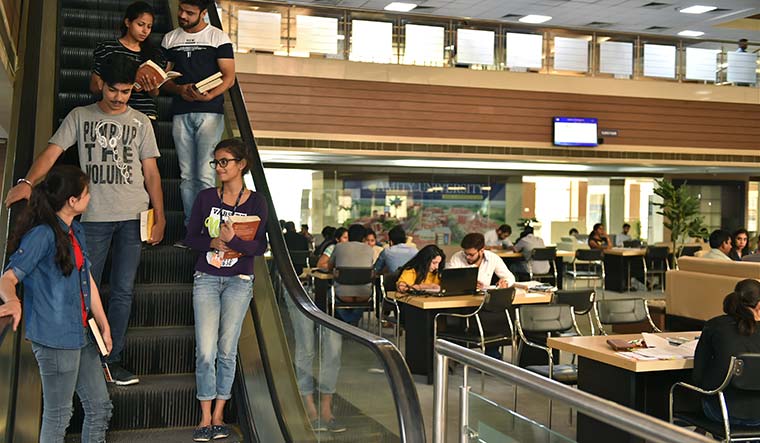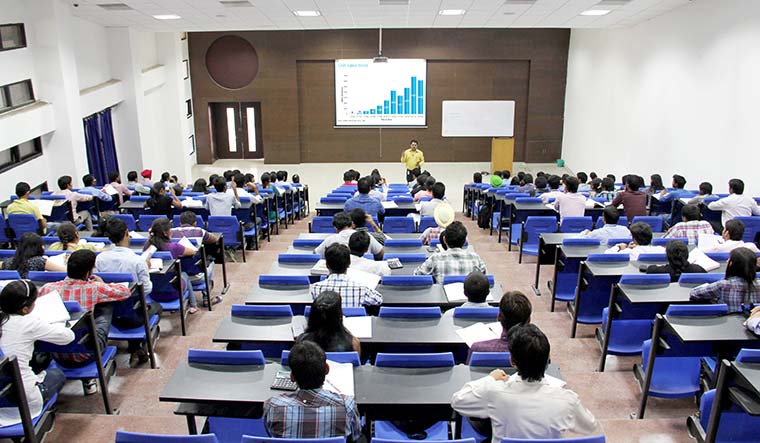When IIT Bombay director Subhasis Chaudhuri found that the online teaching system adopted by the institute to beat the Covid-19 pandemic was not serving its purpose, he put the ongoing semester on pause. Chaudhuri and his team instead launched a summer term under a special dispensation scheme for those expected to graduate in the current academic year. The spring semester is now likely to restart on June 1 and will finish by the end of the month with an appropriately designed evaluation scheme.
Uncertainty regarding admissions, completion of ongoing courses and future placement of students have become major concerns for educational institutions across the country. With Covid-19 cases increasing by the day, regular academic activity is unlikely to restart anytime soon. All regular examinations have been delayed, with the government announcing on May 5 fresh dates for the Joint Entrance Examination (JEE-Mains) and National Eligibility cum Entrance Test (NEET). The JEE-Mains will now be conducted from July 18-23, JEE-Advanced in August and NEET on July 26.
Chaudhuri admitted that the admission process would be delayed because of the postponement, but he said the institute was prepared for it. “If required, we will increase the lecture hours and shall use the vacation to align the academic calendar by December end, and if that is not possible, by June 2021,” said Chaudhuri. “Saving lives comes before education. We shall work out a scheme so that careers of our students are not jeopardised. We do anticipate some disturbances because of the likely economic slowdown. However, IITs always provide manpower at the top of the talent pool.”
IIT Kharagpur has moved its classes to web-conferencing mode, video lectures of the National Programme on Technology Enhanced Learning (NPTEL) and emails. The institute has revised its summer recess, and examinations will now be conducted in July. “The new semester is expected to start in September 2020 and new admissions will depend on the JEE-Advanced examination. At the same time, dates have been extended for PhD applications,” said Bhrigu Nath Singh, registrar of the institute.
For technical institutes like the IITs, technology-enabled learning is the future. With most of them shifting to the online mode, the impact can be felt across the entire system, including admissions and evaluations. Educating the faculty to develop digital content and effectively handle online classes will become even more important.
K.N. Subramanya, principal of the Bengaluru-based RV College of Engineering, said various software platforms were being used to make learning more effective and to achieve digital transformation in higher education. “Our faculty has undergone certificate courses in digital pedagogy conducted by the National Project Implementation Unit (NPIU). They are also regularly taking NPTEL courses along with our students,” said Subramanya. “The ongoing crisis has provided an opportunity to conduct 6,000 online sessions on various topics, projects, experiential learning, seminars and virtual labs.”
At the Indian School of Business, only two weeks were left for the completion of the regular academic year when the lockdown started. The institute, with campuses in Hyderabad and Mohali, moved its classes and evaluations online, wrapping up the academic year and allowing students to complete the programme.
“Some of the students have even started working (from home). For our modular programmes, we are looking to restart classes when permitted by the government,” said Ramabhadran Thirumalai, senior associate dean, academic programmes, ISB. “We use a hybrid model of resident and visiting faculty in our teaching portfolio. Given the uncertainty of calendars, schedules and global travel, we may have to use some amount of online sessions. Educational institutions are being forced to rethink their programmes and courses in innovative ways. But in the long run, students will be the beneficiaries.”
TAPMI Manipal has acquired licences of Webex and Zoom to ensure smooth conduct of its operations. Currently the institute is using Webex to conduct its sessions. Vishwanathan Iyer, dean-academics at TAPMI, said all faculty meetings, interactions with students and prospective candidates and all executive programmes were held via Zoom and Webex. TAPMI completed admission processes at most of its centres before the lockdown. “We are making admission offers and the situation is being monitored closely,” said Iyer. “We expect our students to report to campus from September 1. We believe the new academic year is likely to be stretched till the end of April 2021.”
Despite the contingency plans, the enduring crisis has caused anxiety among students and parents. Yajulu Medury, director, Mahindra École Centrale College of Engineering, Hyderabad, said his institution had received several requests for early counselling. “We will conduct the process completely online. In fact, May 10 is the earliest round of admission counselling and eligible students will be counselled about the branches available and offers will be rolled out accordingly,” said Medury.
For some universities and institutions, online learning has been the norm for quite some time and they are finding it easier to adapt to the new situation. “When the government formulated rules for online degrees, Amity was the first university to get permission and we still have the largest number of approved online degrees,” said Atul Chauhan, chancellor, Amity University. “So, when suddenly all classes for our full-time students had to go online, we were fully equipped and ready. Our students did not miss out on a single day’s class. We rolled out remote learning across all our campuses around the world in a week and brought 1.2 lakh students online. For online examinations we have an advanced software which uses artificial intelligence (AI) to track students via cameras and assists faculty members in live online proctoring.”
Chauhan, meanwhile, anticipates new challenges. He feels that there will be staggering and regrouping of sessions and classes to cover the lost time, rescheduling of teaching hours, curtailing of holidays and weekly offs and rotational working on weekends. “We envisage even logistical problems as many outstation students may face difficulty in travelling back once the lockdown is lifted. Everyone is anticipating continuance of social distancing in one form or the other. This may require restructuring the use of our resources. Medical and health supervision for all will be another challenge,” said Chauhan.
There are many universities that closed since mid-March and want to launch online classes. For many of them, it is a new experience altogether as they have been used to conventional teaching methods. Aligarh Muslim University switched to online teaching as soon as the pandemic struck. “We facilitated e-resources, links, applications and platforms for online teaching material and organised webinars on online teaching for faculty members,” said M. Rizwan Khan, director of Internal Quality Assurance Cell at AMU. “We will conduct examinations under UGC directives. Our summer vacation this time will be a short one in June so that we can complete online classes and examinations. We are preparing for admission tests in July, because the UGC wants to start the new session from September.” Khan said the pandemic had severely affected placements, exchange programmes, various project works, seminars, conferences, training programmes and outreach and extension programmes.
Universities and colleges across the country have realised that it is important to ensure that the education process goes ahead unhindered, with the help of technology and other available options. Most of them are optimistic that they can reinvent the academic culture and reengage students effectively and constructively, under altered circumstances.
Chennai-based Hindustan Institute of Technology and Science (HITS), which has more than 7,000 students on its rolls, switched to online mode as soon as it was closed in the middle of March because of the pandemic. The institute was already using Microsoft Teams for online learning and the transition was, therefore, easy. Online classes became regular by April 15 and the ongoing semester was completed successfully by the end of the month.
“Our advantage was that we already had the licence for the Teams platform from Microsoft. The staff and students gradually got used to the system. Now I have regular videoconferences with different department heads and others through this platform,” said Kuncheria P. Isaac, vice chancellor of the university. “We plan to start the next semester by June 15, which will initially be completely online. Practicals and other aspects which require face-to-face interaction will be done at a later stage. I have even got many guest lecturers and industry experts to speak to students.” Isaac said if the situation continued to be uncertain, the university would conduct online examinations or would go in for an open-book examination system.
At Lovely Professional University (LPU) in Punjab, constant efforts are being made to train the faculty to teach online. The university has completed the syllabus for the current semester and examinations are scheduled tentatively for late June. But if it does not work out, contingency plans are in place to conduct AI-based remote-proctored examinations, which can be taken from home and are not easy to tamper with.
“We have made our admission process completely online. We also have dedicated call centres and WhatsApp teams to support students to make informed decisions,” said Aman Mittal, who heads the division of international affairs at LPU. “Our entrance tests can now be taken from home on an online platform. We are very hopeful that the session will start soon and are drawing up contingency plans to avoid any hassle for our new students.”
O.P. Jindal Global University based in Sonipat, Haryana, expects to complete its spring semester by June 26, giving students time to engage in work-from-home internships or regular internships, if allowed by the government. Arjya B. Majumdar, dean of admissions at Jindal, said examinations were being held on a take-home basis, with question papers being prepared accordingly. “We have made our admission process completely online. A student may apply and even receive and accept admission offers completely online,” said Majumdar.
Most of the universities THE WEEK spoke to indicated that they had anticipated the Covid-19 challenge even before the government went for a complete lockdown. Bengaluru-based Jain University, for instance, had sent its outstation students home as early as March 17. The university has made available counselling teams to ensure low anxiety levels among its students.
“There has been disruption rather than disturbance because of the Covid-19 pandemic,” said N.V.H. Krishnan, registrar, Jain University. “Online is the new normal. Students are taking up more responsibility. Teachers are adapting to the challenges of teaching online. Those who are not tech savvy are learning new skills. Disruption is always an inconvenience in the short-term, but it is good in the long run.”




